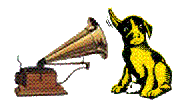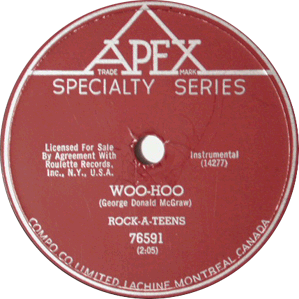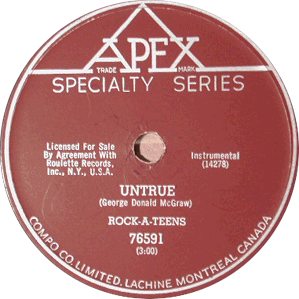
The Beatles
at 78 RPM
|
Cool 78 of the Month August 2005 |
|
The Rock-a-Teens Woo-Hoo Apex 76591 (Canada) October/ November 1959 |

|
|
This month's cool 78 of the month comes to us courtesy the JAN CEE MUSIC Archive. Visit their webpage on: http://stvnj.home.pipeline.com. A tip of the hat to them for the digital images.
The Rock-a-Teens were a 6 piece group from Richmond in the US state of Virginia. They got together in 1956 and were originally known as Boo Walke and the Rockets, a name taken from their guitarist Bobby "Boo" Walke. Over the next 3 years they honed their craft playing gigs around the Richmond area and by 1959 had secured an audition with George Donald McGraw who not only owned a record shop in Salem Virginia, but also owned a record label. The group, now known as the Rock-a-Teens, impressed McGraw with one of their own compositions, Rock-a-Teen Boogie. Rock-a-Teen Boogie is highly regarded for the innovatative drum solos of drummist Bill Smith. The tune was renamed Woo-Hoo, no doubt to match its falsetto refrain, and was released as Doran 3515. Then, in another turn, following claims of plagarism, McGraw bought the song from the boys and cut a deal with Morris Levy who ran Roulette Records to release it nationally. By the time it made its debut on Roulette 4192 as a 45, a group whose original name had been Boo Walke and the Rockets, a song known as Rock-a-Teen Boogie, written by the a group of 6 guys and released on the Doran label, was now heading up the Billboard 100 on Roulette as by the Rock-a-Teens, with the new title Woo-Hoo, and composer credits going to McGraw. The record peaked at number 16 on the Billboard charts in the USA prompting Roulette to encourage the group to put together an entire album.
Roulette, one of the USA's hit making machines with artists like Jimmy Bowen, Buddy Knox, and Jimmy Rogers, had by 1959 stopped releasing 78. In Canada however, Roulette licensed its track to Apex, a label of the powerful Compo Company of Lachine in the province of Quebec. Compo began operation back in 1918 and Apex was one of the first labels in its family, along with Sun. Compo's Sun label, of course, has no connect with the Sun label that would give birth to Elvis in the 1950s. Through licensing agreements, Compo pressed discs for the likes of the US Decca family of labels, as well as licensed recordings from likes of Cadence, United Artists, and Roulette. As they contined production of 78s through 1959 and possibly into 1960, many US releases that did not see a release on 78 in their home country did see light of day at 78 rpm on Apex.
It is the Apex licensed release of Woo-Hoo that we spotlight as our Cool 78 of the Month. This release, catalogue number 76591, would fly up the charts at the influential Toronto radio station CHUM, peaking its 10 week run at number 10 in Novemeber 1959.
Worth noting is that Morris Levy of Roulette Records is no stranger to controversy surrounding composer credit on songs. In the 1970s, Morris Levy's publishing company Big Seven would sue the Beatles' Maclen Music, claiming that John Lennon's composition Come Together plagarised Chuck Berry's You Can't Catch Me. The settlement in this case would eventually lead not only to the release of John Lennon's album Rock n Roll on Apple, but also Levy releasing a nearly identical album, albeit it one of doubtful legality, known as Roots on his own Adam VIII label, a distant cousin of Roulette. That court case would have the word untrue flying across the courtroom, which coincidently was the title of the B-side of the Rock-a-Teens sole hit.
Shown below is an image of the B-side of the 78.
|
|
B Side The Rock-a-Teens Untrue |

|
